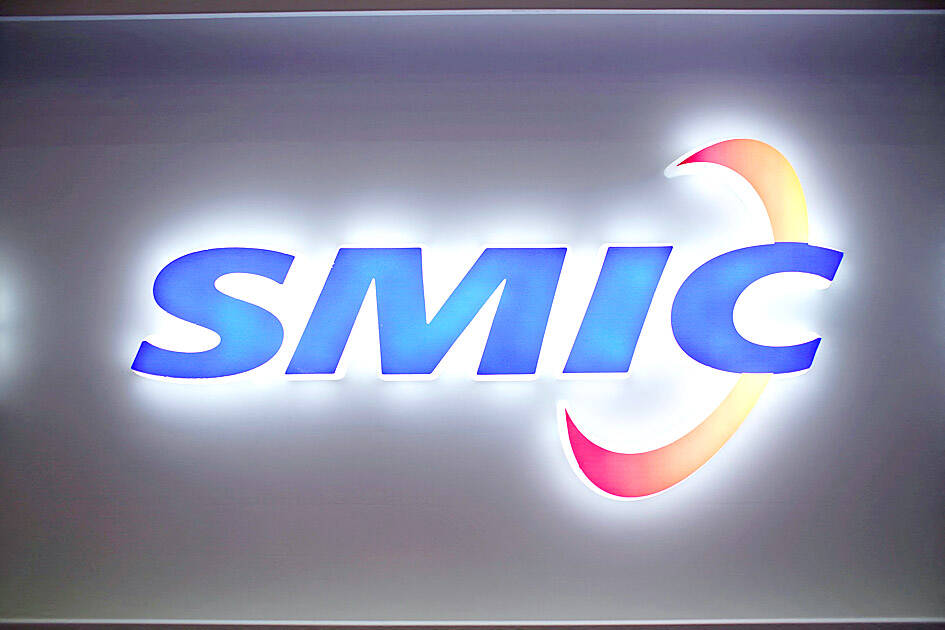China’s top chipmaker, Semiconductor Manufacturing International Corp (SMIC, 中芯國際), yesterday said that its profit last year plunged significantly from the previous year, against a backdrop of surging trade tensions between the US and China.
“Unaudited profit attributable to owners of the company was US$492.7 million in 2024, a decrease of 45.4 percent from US$902.5 million in 2023, mainly due to the decrease of investment income and financial income,” SMIC said in a filing to the Hong Kong Stock Exchange.
Profit in the final quarter of last year also slumped, the filing showed, dropping 38.4 percent year-on-year to US$107.6 million, compared with analysts’ estimate of US$193.45 million, according to LSEG data.

Photo: Reuters
Meanwhile, SMIC’s fourth-quarter revenue grew 31.5 percent to US$2.2 billion, it added, compared with market expectations of US$2.18 billion, according to LSEG.
The company reported a gross margin of 22.6 percent in the fourth quarter, compared with 16.4 percent a year earlier.
SMIC said that, “based on the premise that there are no significant changes in the external environment,” it expects revenue growth in the year ahead “to be higher than industry average in the same markets.”
SMIC’s business remains overwhelmingly focused on mature-node chips for consumer electronics and home appliances, with advanced manufacturing projects, such as Huawei Technologies Co’s (華為) smartphone chips, representing only a marginal portion of its revenue.
The company has ramped up capital investments over the past few years to expand its production capacity and bolster China’s domestic semiconductor capabilities.
SMIC’s capital expenditure surged to US$7.3 billion in 2023 from US$4.5 billion in 2021, reflecting its aggressive expansion strategy. The company invested another US$7.33 billion last year, its latest earnings release showed.
Additional reporting by Reuters

SEMICONDUCTORS: The German laser and plasma generator company will expand its local services as its specialized offerings support Taiwan’s semiconductor industries Trumpf SE + Co KG, a global leader in supplying laser technology and plasma generators used in chip production, is expanding its investments in Taiwan in an effort to deeply integrate into the global semiconductor supply chain in the pursuit of growth. The company, headquartered in Ditzingen, Germany, has invested significantly in a newly inaugurated regional technical center for plasma generators in Taoyuan, its latest expansion in Taiwan after being engaged in various industries for more than 25 years. The center, the first of its kind Trumpf built outside Germany, aims to serve customers from Taiwan, Japan, Southeast Asia and South Korea,

Nvidia Corp chief executive officer Jensen Huang (黃仁勳) on Monday introduced the company’s latest supercomputer platform, featuring six new chips made by Taiwan Semiconductor Manufacturing Co (TSMC, 台積電), saying that it is now “in full production.” “If Vera Rubin is going to be in time for this year, it must be in production by now, and so, today I can tell you that Vera Rubin is in full production,” Huang said during his keynote speech at CES in Las Vegas. The rollout of six concurrent chips for Vera Rubin — the company’s next-generation artificial intelligence (AI) computing platform — marks a strategic

Gasoline and diesel prices at domestic fuel stations are to fall NT$0.2 per liter this week, down for a second consecutive week, CPC Corp, Taiwan (台灣中油) and Formosa Petrochemical Corp (台塑石化) announced yesterday. Effective today, gasoline prices at CPC and Formosa stations are to drop to NT$26.4, NT$27.9 and NT$29.9 per liter for 92, 95 and 98-octane unleaded gasoline respectively, the companies said in separate statements. The price of premium diesel is to fall to NT$24.8 per liter at CPC stations and NT$24.6 at Formosa pumps, they said. The price adjustments came even as international crude oil prices rose last week, as traders

Taiwan Semiconductor Manufacturing Co (TSMC, 台積電), which supplies advanced chips to Nvidia Corp and Apple Inc, yesterday reported NT$1.046 trillion (US$33.1 billion) in revenue for last quarter, driven by constantly strong demand for artificial intelligence (AI) chips, falling in the upper end of its forecast. Based on TSMC’s financial guidance, revenue would expand about 22 percent sequentially to the range from US$32.2 billion to US$33.4 billion during the final quarter of 2024, it told investors in October last year. Last year in total, revenue jumped 31.61 percent to NT$3.81 trillion, compared with NT$2.89 trillion generated in the year before, according to